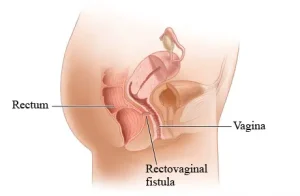Overview
Diagnosis
To find out if a vaginal fistula is causing your symptoms, your healthcare professional will review your medical history, perform a physical exam, and possibly order additional tests.
During the physical exam, the healthcare professional checks the vagina, anus, and the area between them, called the perineum. They look for scarring, irregular vaginal discharge, leaking urine or stool, and abscesses. A pelvic exam may also be done to check the reproductive organs. During this exam, one or two lubricated, gloved fingers are inserted into the vagina while gentle pressure is applied to the abdomen. A device called a speculum may be used to open the vaginal walls for a better view.
If a vaginal fistula isn’t found during the exam, further tests may be recommended, such as:
-
Dye test: The bladder is filled with a dye solution, and if a fistula is present, the dye appears in the vagina or on a tampon after exercise.
-
Cystoscopy: A device called a cystoscope is used to see inside the bladder and urethra for abnormalities.
-
Retrograde pyelogram: A contrast material is injected into the bladder and ureters, followed by an X-ray to detect any openings between the ureter and vagina.
-
Fistulogram: An X-ray image of the fistula helps identify multiple openings or affected organs.
-
Flexible sigmoidoscopy: A thin tube with a camera is used to examine the anus and rectum.
-
CT urogram: A contrast dye and CT scan provide detailed images of the vagina and urinary tract.
-
MRI: Magnetic resonance imaging shows the path of a fistula between the vagina and rectum.
-
Colonoscopy: A flexible camera-tipped tube examines the large intestine and rectum for abnormalities.
If imaging tests confirm a vaginal fistula, a biopsy may be done to check for cancer cells. Blood and urine tests also may be used to identify the cause of symptoms.
Treatment
Treatment for a vaginal fistula depends on its type, size, and surrounding tissue health. Some small or simple fistulas may heal with nonsurgical methods, while others require surgery.
Procedures that may help a simple fistula heal include:
-
Placement of a urinary catheter: A flexible tube drains the bladder for several weeks, allowing small fistulas to close.
-
Ureteral stenting: A hollow tube called a stent keeps the ureter open and can help treat certain fistulas between the vagina and ureters.
For a fistula between the vagina and rectum, dietary changes and stool softeners may be recommended to reduce strain during bowel movements.
Most vaginal fistulas require surgery once infection and inflammation are controlled. Antibiotics may be prescribed for infections, and biologic medicines may be used for conditions like Crohn’s disease.
Surgery involves removing the fistula tract and closing the opening with healthy tissue. Sometimes, a tissue flap is used to reinforce the area. Surgery can be performed through the vagina or the abdomen, and minimally invasive laparoscopic or robotic-assisted procedures are often possible.
Some patients may need additional procedures, such as:
-
Anal sphincter repair: To restore control if the muscle around the anus is damaged.
-
Temporary colostomy: Creates an opening for stool to pass into a bag, allowing the fistula to heal before being reversed later.
Surgery to repair a vaginal fistula is often successful, especially when treated early. However, some cases may require more than one surgical procedure to achieve complete healing.
Advertisement

